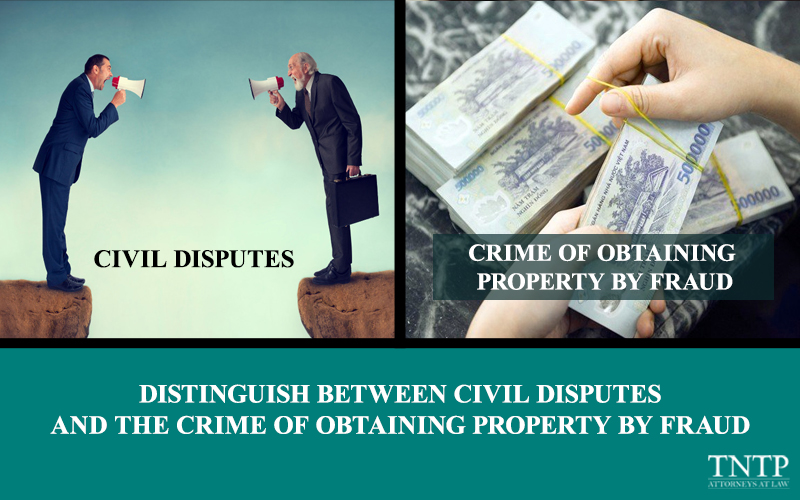In business activities, enterprises cannot avoid the situation that partners or debtors evade payment obligation for months or even years. At that time, many enterprises thought that such action could constitute a crime of Obtaining property by fraud and submitted a denunciation to the competent police agency. However, to be able to constitute the crime of Obtaining property by fraud, the offender must meet all conditions for this crime as prescribed in the Penal Code. In this article, we will show the similarities and differences between Civil disputes and the crime of Obtaining property by fraud for enterprises to apply in real situations.
1. Elements of crime of Obtaining property by fraud
The crime of Obtaining property by fraud is specified in Article 174 of the Penal Code 2015. Accordingly, the elements constituting this crime are as follows:
-
The subject of the crime
The subject of the crime of Obtaining property by fraud is a person who is capable of criminal liability and reaches the age of 16 years or older.
Thus, the subject of the crime of Obtaining property by fraud can only be an individual.
-
The object of the crime
The object of the crime of Obtaining property by fraud is to infringe on property relations (money, things, valuable papers, …), not to infringe on personal relations (life, health, honor, dignity, intellectual property rights, …).
-
The guilty act (Actus reus)
The offender has only one guilty act that is the act of appropriation, but the appropriation is done by fraud.
-
The criminal intent (Mens rea)
The crime is conducted with direct intentional fault because the intention of the offender is the desire to appropriate property. The offender is aware of the consequences of his/her action and wants that consequences to happen. The purpose of appropriation is a mandatory sign and must appear before the act of appropriation is performed.
2. Comparison of civil disputes and the crime of Obtaining property by fraud
-
Similarities:
The act of evading debt payment and the crime of Obtaining property by fraud both begin with one party handing over one or more certain properties to the other party through a contract or other agreement.
-
Differences:
The Subject:
For the crime of Obtaining property by fraud, the subject can only be an individual. Therefore, in case the debtor is an individual, the enterprise may consider denouncing the crime at the competent authority. However, in case the debtor is an enterprise, it cannot denounce the act of obtaining property by fraud because according to the law, the enterprise is not the subject of this crime.
To settle the case where the debtor is an enterprise, the debt collector may denounce the act of Obtaining property by fraud against the person who directly signed the contract (usually the legal representative of the enterprise) or the person who directly holds and uses the property of the debt collector.
Fraud:
In many cases, after entering into a contract, the debtor fails to pay, or intentionally prolongs the payment term, cuts off contact, which makes many enterprises think that it may be a fraud of obtaining property. However, not all actions of the debtor are deception act.
Fraud is to give false information but make others believe it is true so that they hand over the property to the offender. Fraud must be present before the offender appropriates property. Therefore, the debtor is considered to use deception act to appropriate property of the debt collector when the debtor uses false information, and/or conceals the true purpose of the transaction before the parties enter into a contract or transaction to create trust, make the debt collector trust and hand over the property to the debtor.
In case the parties signed a contract legally but then the debtor performs an appropriation act, it cannot constitute the crime of Obtaining property by fraud but becomes the crime of Abusing trust to appropriate property. We have analyzed this crime in the article “Distinguish between Civil disputes and the crime of Abusing trust to appropriate property”
Above are legal sharings that help enterprises distinguish between civil disputes and the crime of Obtaining property by fraud. We hope this article is useful for you.
Best regards.
You may need Distinguish between Civil disputes and the crime of Abusing trust to appropriate property
Join Fanpage Dispute Settlement And Debt Collection to have more useful legal knowledge.
TNTP & Associates International Law Firm
Lawyer Nguyen Thanh Ha
Email: ha.nguyen@tntplaw.com







